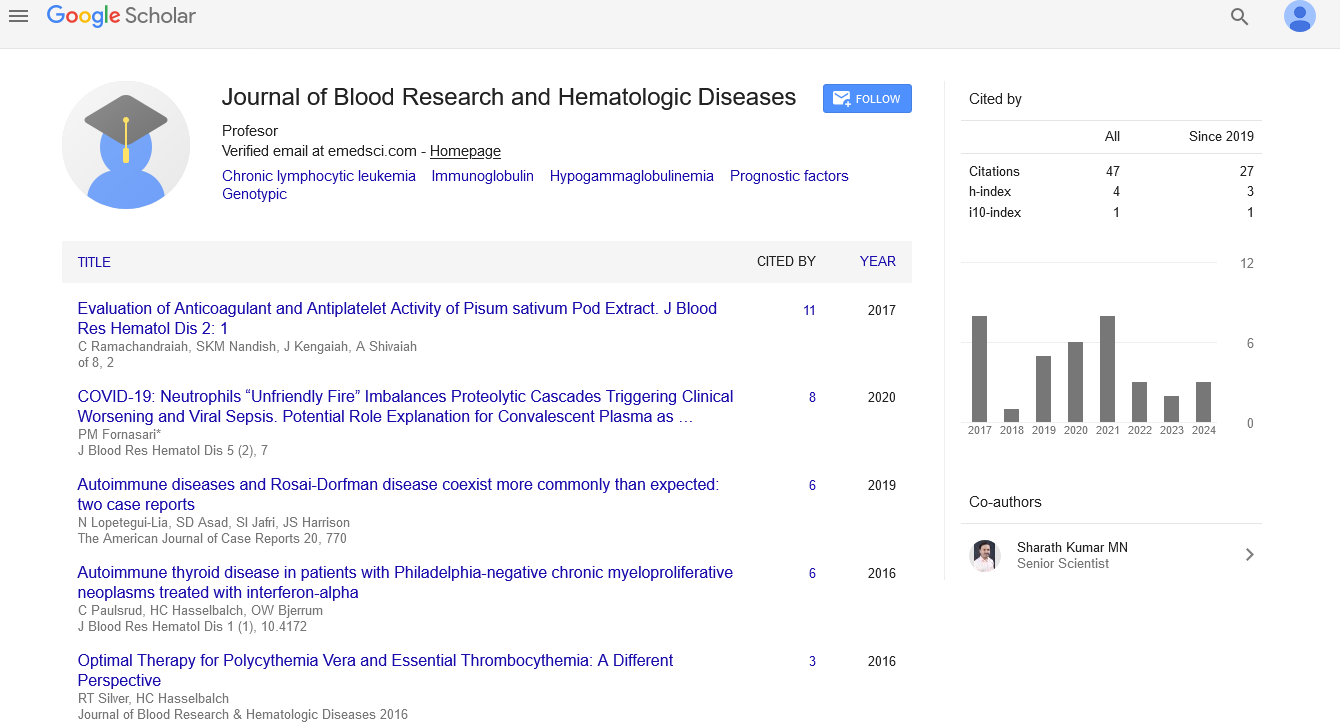Opinion Article, J Blood Res Hematol Dis Vol: 8 Issue: 2
Anticoagulant Therapies: Development and Challenges in the Management of Thrombosis
Basazn Geta*
1Department of Pharmacology, University of Gondar, Gondar, Ethiopia
*Corresponding Author: Basazn Geta,
Department of Pharmacology, University
of Gondar, Gondar, Ethiopia
E-mail: getabasazn@gmail.com
Received date: 29 May, 2023, Manuscript No. JBRHD-23-106796;
Editor assigned date: 31 May, 2023, PreQC No. JBRHD-23-106796 (PQ);
Reviewed date: 14 June, 2023, QC No. JBRHD-23-106796;
Revised date: 21 June, 2023, Manuscript No. JBRHD-23-106796 (R);
Published date: 28 June, 2023, DOI: 10.4172/jbrhd.1000170
Citation: Geta B (2023) Anticoagulant Therapies: Development and Challenges in the Management of Thrombosis. J Blood Res Hematol Dis 8:2.
Description
Thrombosis, the formation of blood clots within blood vessels, poses a significant medical challenge with potential life-threatening consequences. Over the years, the development of anticoagulant therapies has been instrumental in preventing and managing thrombotic events. This article explores the evolution of anticoagulant therapies, their mechanisms of action, and the challenges faced in the management of thrombosis.
Understanding thrombosis: Thrombosis occurs when there is an imbalance in the coagulation system, leading to the formation of blood clots. These clots can occur in both arterial and venous systems, giving rise to conditions such as heart attacks, strokes, and Deep Vein Thrombosis (DVT). To prevent thrombotic complications, anticoagulant therapies have been developed to inhibit clot formation or dissolve existing clots.
Traditional anticoagulant therapies: Historically, anticoagulant therapies primarily relied on oral vitamin K antagonists, such as warfarin, to inhibit the synthesis of clotting factors in the liver. While effective, these drugs require regular monitoring due to their narrow therapeutic window, making them challenging to manage. Patients on warfarin need frequent blood tests to adjust the dosage and minimize the risk of bleeding or clotting complications.
Direct Oral Anticoagulants (DOACs): In recent years, DOACs have revolutionized thrombosis management. Unlike traditional anticoagulants, DOACs directly target specific clotting factors, such as Factor Xa or thrombin, reducing the need for monitoring and dose adjustments. DOACs, including apixaban, rivaroxaban, dabigatran, and edoxaban, have demonstrated comparable or even superior efficacy and safety profiles compared to warfarin. They have become the preferred choice for many clinicians due to their convenience and lower risk of complications.
Targeted therapies and novel agents: The development of targeted anticoagulant therapies is an ongoing area of studies. These therapies aim to inhibit specific components of the coagulation cascade, allowing for more precise control of clotting without affecting other physiological processes. Factor Xa inhibitors and direct thrombin inhibitors are examples of targeted therapies that have shown promise in clinical trials. Additionally, investigation is underway to explore novel agents that could further enhance thrombosis management.
Challenges in anticoagulant therapy
While anticoagulant therapies have significantly improved the management of thrombosis, several challenges remain:
Bleeding risk: Anticoagulants carry an inherent risk of bleeding complications. Finding the right balance between preventing clot formation and minimizing bleeding risk is vital, particularly in highrisk patient populations.
Reversal agents: The introduction of DOACs has necessitated the development of specific antidotes to reverse their anticoagulant effects in emergencies. Reversal agents like andexanet alfa for Factor Xa inhibitors and idarucizumab for dabigatran have been developed, but access and awareness remain challenges in some healthcare settings.
Drug interactions: Anticoagulants can interact with other medications, increasing the risk of bleeding or reducing their efficacy. Close monitoring and awareness of potential interactions are essential in patients receiving multiple medications.
Patient adherence: The success of anticoagulant therapy relies on patient adherence to prescribed regimens. Skipping doses or discontinuing treatment prematurely can increase the risk of clot recurrence.
Monitoring and education: Despite the advantages of DOACs, some patients still require regular monitoring due to specific medical conditions or renal impairment. Ensuring patient education about their condition and treatment is vital for better management and adherence.
Individualized treatment strategies
Developing individualized treatment strategies is essential in thrombosis management. Factors such as the patient's medical history, age, comorbidities, and bleeding risk must be carefully considered when choosing the appropriate anticoagulant therapy. Clinicians must tailor treatments to each patient's needs to optimize outcomes and minimize adverse effects.
Conclusion
Anticoagulant therapies have revolutionized the management of thrombosis, offering effective and convenient alternatives to traditional agents like warfarin. The development of DOACs and targeted therapies has significantly improved patient outcomes and reduced the burden of thrombotic complications. However, challenges remain, including managing bleeding risks, ensuring access to reversal agents, and promoting patient adherence. Overcoming these obstacles will require continued studies, education, and collaboration among healthcare providers, ultimately leading to more effective thrombosis management and improved patient outcomes. With ongoing advancements in anticoagulant therapies and innovative approaches, the future holds the promise of even better outcomes for patients at risk of thrombotic events.
 Spanish
Spanish  Chinese
Chinese  Russian
Russian  German
German  French
French  Japanese
Japanese  Portuguese
Portuguese  Hindi
Hindi 